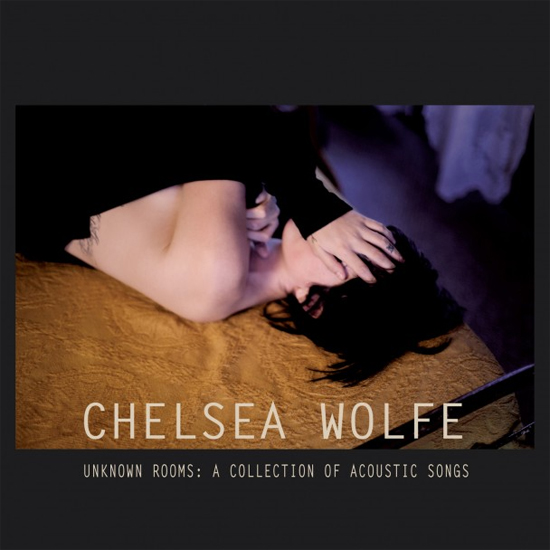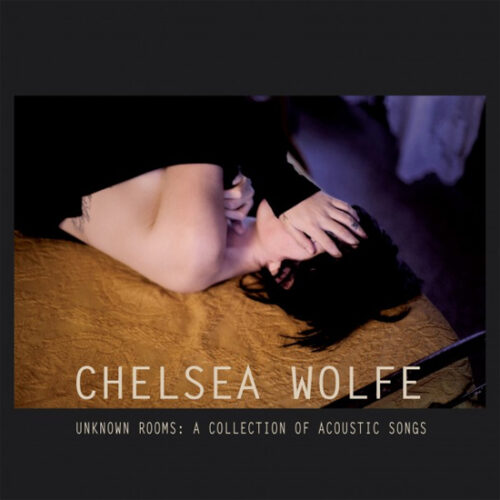For an album inspired by epiphanies, Chelsea Wolfe’s previous album, 2011’s Apokalypsis, was surprisingly dense. Beginning with rasps and distorted screams, its songs played out beneath a blanket of feedback, drones and reverb. Anyone who has been stunned to hair-raising silence while watching Wolfe perform ‘Halfsleeper’ (from 2010’s The Grime & the Glow) will testify to Wolfe’s immense talent. It’s just that sometimes the veil of heavy atmosphere, like the masks she used to wear onstage, felt like a barrier placed deliberately between Wolfe and her audience – as if she was worried the songs weren’t up to it. In that sense, Unknown Rooms feels like a major step forward.
"I want simplicity", she sings in ‘Flatlands’, acoustic guitar and violin gliding above a soft bass drum pulse that gives life to the sentiment of her lyrics. A later track, ‘Our Work Was Good’, borrows a line from Townes Van Zandt’s ‘Nothin’; indeed, ‘Flatlands’ is a worthy musical descendant of the Texan’s sombre country folk and immediately marks Unknown Rooms out as possessing a maturity often obscured in her earlier work. Her vocals are also cut loose, demonstrating what an unusual (and gifted) singer she is, her strange, almost Nordic phrasing easing from breathy, folky gospel to an icy, soft-focus falsetto.
Wolfe has always claimed that she intends more positivity than people give her credit for, and while her lyrics are littered with references to death and heartbreak, she does frequently offer hope. On ‘Flatlands’ the heart might be dead, but the "mind is unafraid". "Our hands were tired", she sings later, "but our work was good, and our hands would hold". There is plenty of despair in Wolfe’s lyrics – occasionally too much – but hope only needs to exist in miniscule doses, and that is the very least on offer here.
Musically too, the landscape is nuanced. While the plucked guitar and violin on the verse of ‘Spinning Centers’ drips and trickles like thawing ice, Wolfe’s accompanying vocal is glacial, cutting the air with acuteness and fragility. On ‘Appalachia’, Wolfe sings of the "shining gutter" while major and minor chords alternate below breathy, winding strings; wonder meets trepidation and does so among the hills of frontier America, where opportunity is tempered by uncertainty.
The least optimistic moments come on ‘Boyfriend’. Accompanying the unsettling lyrics of Sacramento writer Karlos Rene Ayala’s original ("Women are poisonous animals … You call it passion, I call it a cancer") is a guitar line of sparse, isolated notes. Later it is joined by brassy synth, but still each note is given time to strike, doing so with the impact of a sledgehammer striking thick, taut cable. It verges on overwrought, but its delivery poses the question of Wolfe’s earlier work: what need for smoke machines and face masks, when you can summon storm clouds?
Unknown Rooms is reportedly a collection of "once-orphaned songs", which is an ominous premise upon which to build an album. Only the closing pair of tracks – the grainy, underdeveloped ‘Hyper Oz’ and the wonky, piano stutter of ‘Sunstorm’ – fail to deliver, lingering awkwardly in the background while the rest thrive under renewed attention. Overall, though, Unknown Rooms is very, very accomplished, giving the sense that Wolfe has realised the extent of her own ability and acted on it. Her third album proper, due for release next year, will reportedly incorporate more electronic elements (and inevitably attract more lazy comparisons to Zola Jesus). Whatever direction Wolfe takes next, it won’t be straightforward – but it will be worth following.



